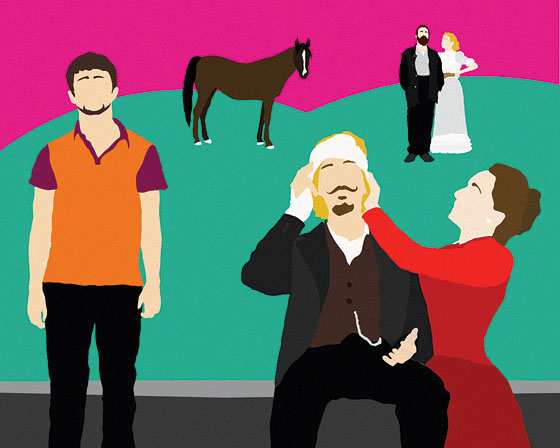
Equus, a middlebrow sensation in 1974 thanks to big ideas and a little class, has returned to Broadway. And it’s a sensation once again, although the young crowds outside the Broadhurst are there not for Peter Shaffer’s drama but for Daniel Radcliffe and his magic wand. Obsessive fans of Harry Potter—writers of erotic fan fiction, for example, hoping for an unobstructed view—are urged to sit house right. For the rest of us, the question isn’t whether Radcliffe can act; as we know from his increasingly adequate performances in the Potter movies, he can, a little bit. But can he hold a stage? And how potent will he be as Alan Strang, the young man whose blinding of six horses sets Equus in motion?
That he’s not terribly convincing isn’t really Radcliffe’s fault. His Strang is shouty and uncomplicated, and he overplays the weirdness—he’s so skittish in his biggest scene that it’s a wonder that Anna Camp, playing the girl, even bothers to get to first base with him, much less naked. But he’s always compelling to watch, especially in his tender interactions with the production’s primary horse, played by Lorenzo Pisoni.
The problem is that Alan Strang himself isn’t convincing. He’s written not as a person but as the answer to a question: What would drive someone to this? The play’s neat view of psychology as a series of magnets snapping together makes it a case study rather than a drama, with details presented to us, in order, so we can assemble the puzzle.
As Martin Dysart, the child psychiatrist whose ferreting out of Strang’s mysteries leads to an existential crisis, Richard Griffiths nods a lot, asks only the right questions, and sounds as though he’s been airlifted in from someplace where they roll their Rs with impunity. Last seen on Broadway in Alan Bennett’s The History Boys, Griffiths is a far better talker than he is a listener—not the greatest quality in a therapist—and just as his prodigious verbal gifts can keep him at a remove from feeling, his onstage bulk keeps him at a remove from his fellow actors; even the crucial moment when Dysart holds and consoles Strang feels physically and emotionally awkward. So little connection does Dysart have to Strang that when he held out a bottle containing a pill meant to help Alan tell the truth, I was reminded of nothing so much as Professor Snape menacing Harry Potter with Veritaserum. And while his delivery of Shaffer’s speeches is flawless, it’s rarely convincing; “You see, I’m desperate,” he tells us, with a marked lack of desperation.
But maybe Griffiths is just underplaying to balance out nearly everyone else. Carolyn McCormick as Strang’s mother, Dora, was apparently directed by Thea Sharrock to play every scene as if it were her last on earth. (To be fair, it’s hard to imagine anyone trying a low-key delivery of lines like “He’s one patient out of many to you, Doctor. But he’s my son!”) Coming off worst is Kate Mulgrew, playing the magistrate who serves as Dysart’s workplace wife. Mulgrew plants her feet, levels her steely gaze, and delivers her lines with vehemence—which doesn’t sound that bad, except that she does this pretty much every time she speaks.
But what choice does she have? She’s trapped in an old-fashioned play weighed down by its well-made characters, its Jungian dream theory, its Freudian overtones. (Dora? Seriously?) That’s not to mention the outmoded therapy techniques on display; I’d forgotten that Act One ends with an honest-to-God hypnosis, complete with smoke machine and “Your eyyyyyes … are getting very … heavy.” It’s too bad that one of the few aspects of the script to retain cultural currency—its strikes against brand names and consumerism—was cut from this production. I guess casting Harry Potter as your star renders that argument moot.
Equus
By Peter Shaffer.
Broadhurst Theatre. Through February 8.